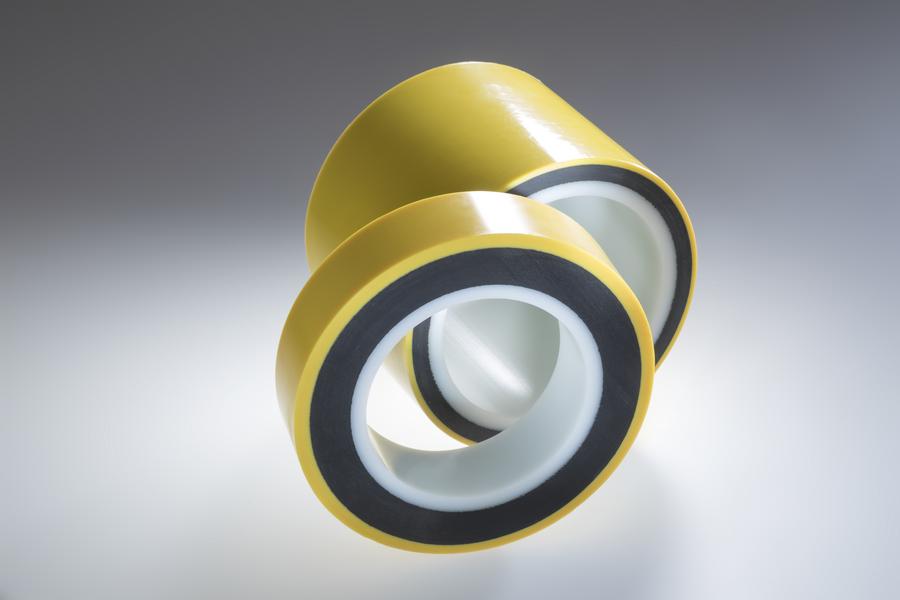- Carbon Fibre PA12 in TCP applications certified for up to 30-year lifetime –
Strohm and Evonik have been awarded the full certification from DNV, attesting that the unidirectional Carbon Fibre PA12 tape “VESTAPE® PA12-CF” (PA12) used for Strohm’s Thermoplastic Composite Pipe (TCP) is fit to use for dynamic sweet and sour hydrocarbons, water, and gas injection applications according to DNV-ST-F119.
The two companies, in partnership with the Netherlands Aerospace Centre (NLR), have led the way in the development, qualification and supply of PA12 for TCP applications following an intensive investment and testing programme over the past five years.
The novel knowledge-based approach introduced in DNV-ST-F119 and fully utilised by Strohm and Evonik has been trailblazing in seeking a fundamental understanding of the material to demonstrate the lifetime performance of a product operating in a challenging chemical, thermal and mechanical environment. It has established a relationship between the functional requirements of a pipe and the performance characteristics of its materials.
NLR provided the main composite testing facilities which allowed parallel dynamic and long-term testing, thus speeding up the process significantly compared to traditional sequential testing.
PA12 is a fully non-metallic, corrosion-resistant solution. Due to the use of carbon fibres, it is exceptionally resistant to fatigue-based failures, marking it a perfect choice for any dynamic application from jumpers to flowlines and risers, including sweet and sour hydrocarbon, water, and gas service.
The high stiffness of carbon fibres paired with the load transfer capability of PA12 as matrix also enables it for deepwater service and operating pressures up to 700 bar and temperatures up to 80°C. The material has been qualified for a lifetime of up to 30 years.
Further expansion of the scope will include hydrogen and carbon capture, utilisation and storage.
Alexandre Paternoster, material technology team lead at Strohm said: “Our fully non-metallic solution for load-bearing structures shows great potential to meet any challenges that corrosive environments can bring. Being applicable to both static and dynamic mode in hydrocarbon offers a great variety of addressable applications, including flowlines and risers.“
Carsten Schuett, industrial and energy technology leader at Evonik added: “Developing a material class for disruptive technologies is always challenging. PA12 for Strohm’s TCP applications was no exception. The full application of the DNV’s standard’s approach to qualify the material has only added to the complexity but, with the help of our partners, we finally succeeded in characterising the material in unprecedented detail and unlocked its full potential. The resulting dataset can be used generically, removing the need for material qualification in further projects which further enables us to use it for energy transition applications such as hydrogen transport and carbon capture utilisation and storage.”
Ramin Moslemian, principal consultant at DNV and lead for non-metallic technologies said: “Invention of high performance thermoplastic composite tapes such as PA12 offers innovative alternative solutions for pipeline infrastructure, which can potentially have lower costs and environmental footprint. This is the case not only for traditional oil and gas industries, but also for pipeline infrastructure of the energy transition for the transportation and storage of carbon dioxide in carbon capture and storage as well as hydrogen.”
Rens Ubels, principal project engineer at NLR added: ““Testing carbon reinforced, saturated, PA12 specimens in-situ in NORSOK fluid at elevated temperatures was quite a challenge. We successfully designed and built dedicated fatigue and stress rupture set-ups to be able to meet the test specifications and the safety and health regulations.”
Caroline Justet, business growth executive at Strohm commented: “Hydrogen embrittlement and carbon dioxide dense phase transportation are of no concern for this material class. Thanks to the work accomplished by Strohm, Evonik, and NLR, extending the certification to hydrogen and carbon dioxide is a formality. TCP is the preferred technology to unlock the potential of offshore wind-to-hydrogen, providing a safe and cost-effective solution to the challenges faced in today’s offshore hydrogen industry.”
Strohm’s track record and extensive offshore experience with TCP is a prerequisite to aiding the offshore energy industry’s transition from hydrocarbons to green alternatives. The company is committed to supporting the global industry’s net zero carbon emissions goals.
TCP is a strong, non-corrosive, spoolable, lightweight technology which is delivered in long lengths, resulting in a significant reduction of transportation and installation costs. TCP is installed using small vessels or subsea pallets, significantly reducing CO2 emissions. It is also 100% recyclable.
A whitepaper discussing the qualification can be found here.
For more information, please feel free to contact us.
